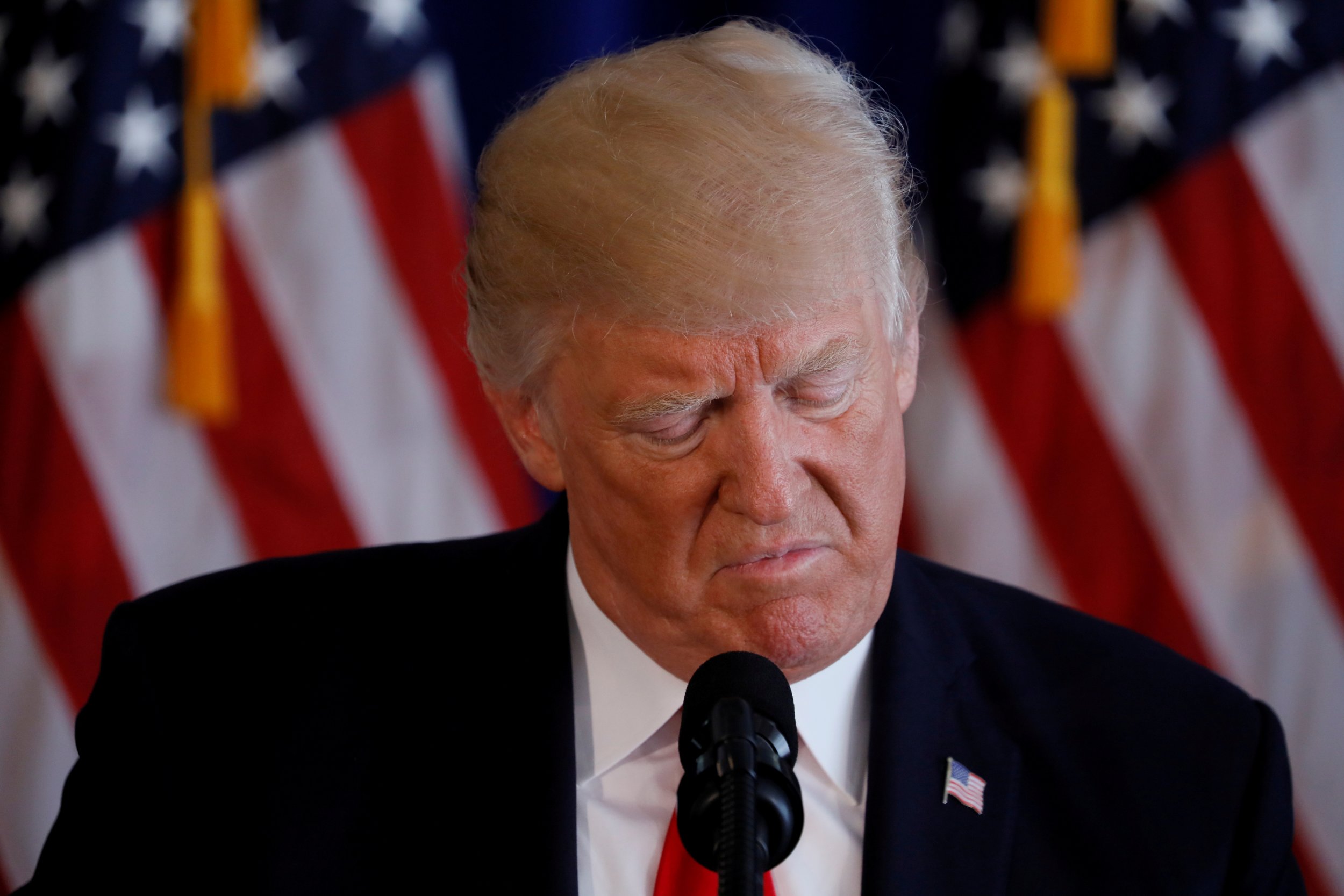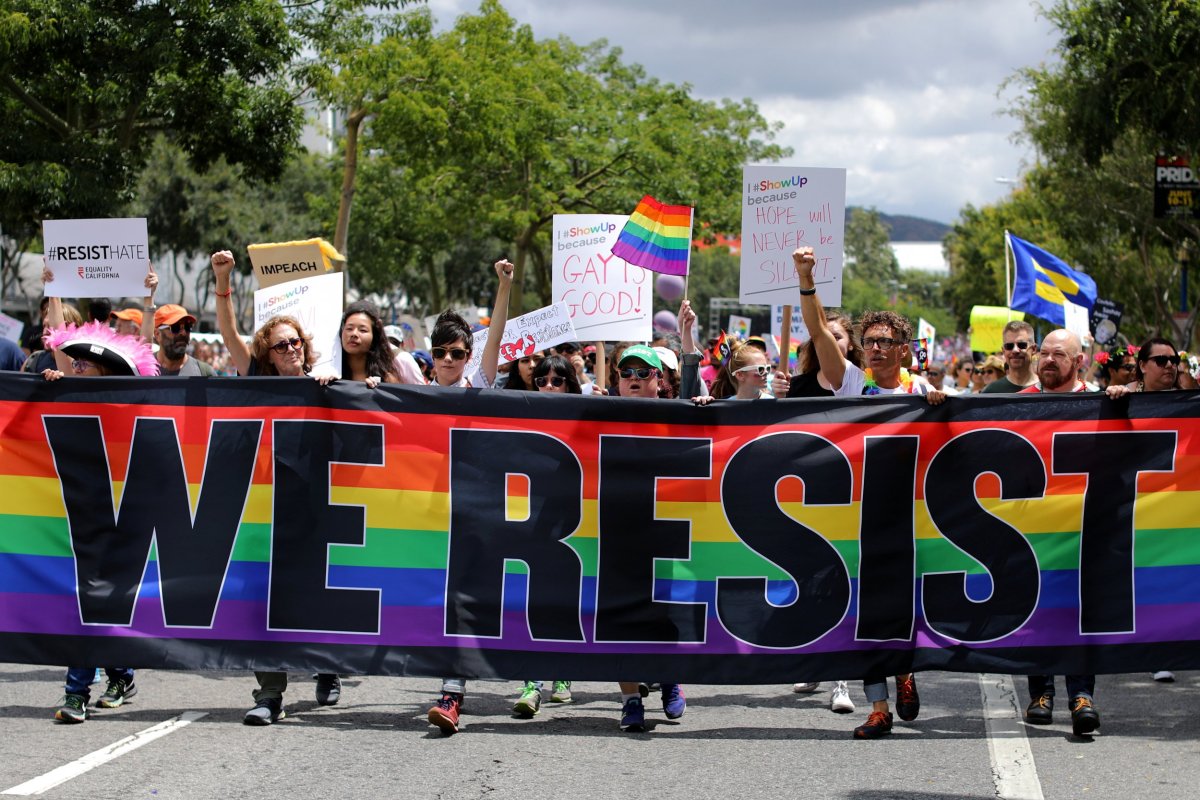
In the year since Donald Trump was elected president on a promise to "drain the swamp" of Washington's corruption, Americans have become more, not less, convinced that Washington is corrupt, and that the White House is the most corrupt institution in U.S. government.
A new public opinion poll conducted over the past two months found that Americans don't believe that Trump is cleaning up the government. In fact, the opposite is true: 58 percent of people surveyed say the level of corruption has risen in the past 12 months, up from 34 percent who said the same in January 2016.
And more Americans put the blame at the top: 44 percent now believe that most or all of the officials in the Office of the President are corrupt—up from 36 percent last year, and worse than perceptions of Congress (38 percent of Americans believe Congress is the most corrupt institution).
Americans also suspect big business: 32 percent of those polled believe business executives are corrupt.
Trump's administration also has not made Americans more confident that the government can stop double-dealing, fraud or dishonesty. Seven out of 10 Americans believe the government is failing to fight corruption—up from half last year.
The poll was commissioned by Transparency International, a Berlin-based corruption oversight nonprofit that gauges conflicts of interests and other corruption in governments worldwide, and publishes an annual ranking of the most corrupt nations. Last year, before the Trump administration took office, the U.S. ranked 18th in terms of perceived corruption, with Denmark at number one, perceived as the most corruption-free nation. Somalia, at 176th, was perceived as the most corrupt.
Since before he took office, Trump and his family's personal conflicts of interest, and his agencies' revolving doors, have been widely reported on in the media and heavily criticized by ethics lawyers and government watchdogs.
While the president handed off day-to-day oversight of his company to his sons Eric and Donald Jr., his hotels and golf courses have become vehicles for lobbyists and foreign dignitaries to curry favor with the administration, and, in the case of the golf courses, actually meet and play with the golf-loving president.
Shortly before his election last year, the Trump campaign trotted out a new slogan and a five-point plan for ethics reform that featured new lobbying restrictions. The plan was called "drain the swamp."
But a year later, he had stocked his agencies with lobbyists for industries that were regulated by the agencies, and his administration has been rocked by almost daily legal and investigatory bombshells related to corruption. Trump is being sued in Maryland and Washington, D.C., for violating the "emoluments clause" of the U.S. Constitution by running his Trump International Hotel in Washington, D.C.; Paul Manafort, the second Trump campaign manager, has been indicted on money-laundering charges; Trump's first national security adviser, Michael Flynn, has pleaded guilty to lying to the FBI in an investigation that also uncovered secret lobbying work for the Turkish government; and his son-in-law, Jared Kushner, failed to disclose $1 billion in loans tied to his real estate company, and has repeatedly had to revise his financial-disclosure forms to add items he "forgot."
At least six Trump Cabinet secretaries are being investigated for or asked about exorbitant travel expenses, including using government planes for private business, security details or business dealings.
Cabinet members, including Veterans Affairs Secretary David Shulkin and Interior Secretary Ryan Zinke, have used travel to combine business with pleasure and fundraising. Shulkin took in a Wimbledon tennis game on business, and Treasury Secretary Steven Mnuchin reportedly spent at least $800,000 on nonwork travel, including a viewing of the August 21 solar eclipse. He also requested a jet for his honeymoon, and to take his wife to the Fort Knox gold reserve.

The president's hiring of his daughter Ivanka and son-in-law are at odds with the federal anti-nepotism law, which states that "a public official may not appoint, employ, promote, advance, or advocate for appointment, employment, promotion, or advancement, in or to a civilian position in the agency in which he is serving or over which he exercises jurisdiction or control any individual who is a relative of the public official." His Justice Department gave him an exemption, however.
Nepotism and Trump's refusal of transparency with respect to his businesses prompted the resignation of Walter Shaub, who quit in July as head of the federal government's ethics office. Shaub had been a ferocious critic of the Trump administration's blasé attitude about government ethics norms.
"I can't know what their intention is," Shaub said in an interview after he resigned. "I know that the effect is that there's an appearance that the businesses are profiting from his occupying the presidency. And appearance matters as much as reality, so even aside from whether or not that's actually happening, we need to send a message to the world that the United States is going to have the gold standard for an ethics program in government, which is what we've always had," he continued.
"America should have the right to know what the motivations of its leaders are, and they need to know that financial interests—personal financial interests—aren't among them," Shaub said.
The US Barometer 2017 poll was conducted by Efficience3, which directed a computer-assisted telephone poll of 1,005 respondents in the U.S. in October and November. Respondents were selected using random digital dialing, and data was weighted to be demographically representative of all adults in the United States by age, gender, social grade, region, rural/urban area and ethnicity.
Uncommon Knowledge
Newsweek is committed to challenging conventional wisdom and finding connections in the search for common ground.
Newsweek is committed to challenging conventional wisdom and finding connections in the search for common ground.
About the writer
Nina Burleigh is Newsweek's National Politics Correspondent. She is an award-winning journalist and the author of six books. Her last ... Read more
To read how Newsweek uses AI as a newsroom tool, Click here.








